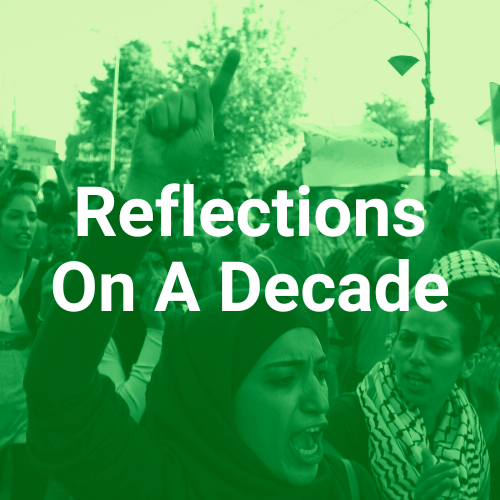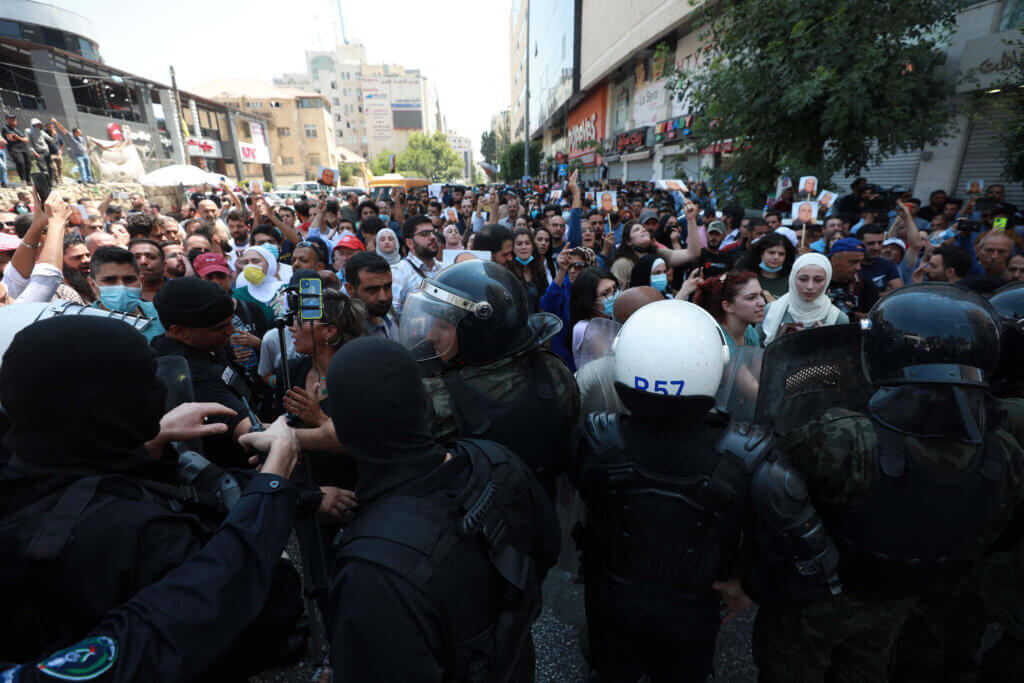
In May 2021, we witnessed a Unity Intifada in Palestine. It extended across the lands which held us, and our power was once more revived as we confronted the fear of colonial practice implanted in us. Almost one year later, we saw the killing of Shireen Abu Akleh on May 11 of this year.
At that moment, all of Palestine was in collective grief.
In the streets we afforded ourselves a moment to grieve. Just a moment to cry and allow our bodies to feel all wounds — the ones we experienced and those that are older than us. It was as though, for a moment, we collectively broke free from submission and repression.
It was in that brief instant that I realized that while colonial regimes and oppressive powers might have mastered how to rule by fear and imprisonment, they are neither able to comprehend nor control the eruption of collective revolt.
In 2011, the Arab revolutions in Tunisia and Egypt had a special place in our spirits. After 29 years of Husni Mubarak’s rule over the Arab Republic of Egypt, the Egyptian people protested against the ruler and his rule at Tahrir Square, demanding the fall of the regime.
The Tunisian people raised the volume of their demand to put a limit on the rule of Ben Ali. After years of being too afraid to delve into politics, due to the imposed absence of those opposing the regime, it seemed that those people were somewhere behind the sun, as was communicated in Tunisian circles prior to the revolution.
We went on strike and protested in central Palestinian cities, where we were met by Palestinian security forces. At times they would try to contain us, and at others they would meet us with violence and censorship. This experience left me with the awareness that in times of revolt, we experience the best and the worst of society.
The revolutionary contagion extended to the entirety of the Arab world. It was a shock to witness the revolutionaries in the streets, a sight that ripped youth from decades of despair and indifference.
We went into the streets in Palestine as well. We demanded elections for a new Palestinian National Council, holding up the slogan “A new National Council, representing Palestinians across the world.” We went on strike and protested in central Palestinian cities, where we were met by Palestinian security forces. At times they would try to contain us, and at others they would meet us with violence and censorship. This experience left me with the awareness that in times of revolt, we experience the best and the worst of society. We witnessed solidarity and collective appreciation for the land and its people, and we experienced neglect from our male friends and comrades, who viewed themselves as intellectually superior and more level-headed than their fellow female activists.
The spread of the Arab revolts in the world insisted that we join the wave of revolt internally. It made us raise our voices to create change in Palestinian society, in the name of unity. The settler-colonial reality in Palestine also guided us to protest against settlements in areas that excelled in resistance, such as Nabi Saleh and Bi’lin.
The point was to avoid having our behavior be dictated by reactions. We watched developments at the social and political levels across the region. The slogans echoing across the Arab world spoke to one another, with only subtle changes to dialects and accents. After Mubarak declared that he would step down from his rule, different groups and individuals started planning protests in Manara Square, to celebrate with Egypt and its people. We headed to the streets spontaneously, resembling organized chaos. Our joy could not be contained as we all chanted “The people of Egypt brought down the regime.”
The excitement gradually ebbed due to little defeats. The revolts were met with arrests, harassments, injuries, and killing. At the level of internal mobilization, the fissures that were created were a result of polemics, disappointment, and patriarchal practices. A revolt means a complete overturning that necessarily begins with the awareness of communities, groups, and individuals. To face every fissure, the matter may require many more revolts.
The opinions around the effectiveness and the tangible results of revolts may vary, but now I realize that despite the uncertainty of the outcome of the Arab revolutions, the awareness of Egyptian or Tunisian identity did not replicate itself. The collective imagination no longer saw Egypt as an epicenter for dictatorship that made revolution seem impossible. In Tunisia, the people no longer shut their phones off out of the fear of having their political conversations tapped and surveilled by the intelligence apparatus.
In this way, the revolution, itself, was the impossible that was made possible.
We realized that it was the continuation of oppression that was impossible, not the revolution. What stands as a testament to this change is our very breaking and the scars on our injured bodies. The years of arrest. The pain of loss still in our chests and the shocks that came from the desecration of our bodies.
These pains stand as a testament to the inevitable expansion of our minds. They are also the witnesses to the ways in which defeat snuck its way into our breath. As for the oppressive rulers — they became alert and prepared to face the people with weapons and batons, hoping to crush a people that knows, even if subconsciously, that the awakening is inevitable, even if it takes time to arrive.
The killing of Nizar Banat by Palestinian police on June 24, 2021, was a critical moment in our relationship with the Palestinian Authority. There was rage as the police clashed with the protesters in Ramallah, and women were sexually harassed during protests. This time the police were more brutal, firing tear gas and detaining protesters even before the protests started. Nevertheless, there was social accountability.
Today, almost a decade after the Arab revolutions, we understand the necessity of social accountability. The people have the responsibility to constantly question those in power, to be the deterrent in the face of oppression.
The aftermath of the Arab revolutions revealed the price nations have to pay for their silence. Silence in the face of corruption and oppression will only lead to poverty, economic collapse, and will create an oppressive environment for the next generations.
Perhaps our revolts and uprisings in the streets and public squares is our way of releasing our collective traumas, inherited from decades of relentless repression, dictatorships, violence, colonialism, and patriarchy.
During every uprising, we shed parts of these fears. No matter the scale and the size of our revolt, it all comes together in a cumulative awareness, a conscious understanding that we must revolt every day in response to colonialism, settlement expansion, oppression, patriarchy, and corruption. We do this to afford our bodies a liberation that is rooted in the freeing of our minds and our consciousness.



We have to know what we are for, as well as what we are against. No vision of the kind of society and government we want? we’ll get whoever is strong enough to take over. Look at Egypt. Look at the US, for that matter.
“we experienced neglect from our male friends and comrades, who viewed themselves as intellectually superior and more level-headed than their fellow female activists….liberation that is rooted in the freeing of our minds and our consciousness…. to avoid having our behavior dictated by reactions.”
___________________________________________________________
Hurriyah Ziada may well be characterizing determinate dynamics.
1 of 2
Haaretz Editorial. Nov 21, 2022,
“A Convicted Criminal as Israel’s Super Police Chief”
“The independence of the government bodies charged with enforcing the law & administering justice is a pillar of democracy. Their ability to refrain from having decisions dictated by the whims & needs of politicians is fundamental to the principle of separation of powers & is critical to preserving the structure of the government of Israel.
“But it now appears that Prime Minister-designate Benjamin Netanyahu has agreed to undermine that balance by enabling Itamar Ben-Gvir, his candidate for public security minister, to amend the Police Ordinance Law. The amendment will subject the police – which until now have enjoyed independence – to the Otzma Yehudit leader, who will be able to set police policies.
“The amendment, which the two have agreed upon, should not be taken lightly. It means that Ben-Gvir, a dangerous right-wing extremist who has been convicted of criminal offenses, will effectively become the country’s police chief. He will be the one who decides how the police allocates its resources, how it operates in the field &, most of all, against whom.
“The power that Netanyahu is putting into Ben-Gvir’s hands will subordinate the police leadership to his authority. It means that the police will become politicized to favor the extreme right. In practice, it constitutes not just a blow against the separation of powers but a serious danger to the rights of Israel’s Arab citizens. Even if the public security minister-designate wasn’t Ben-Gvir, the proposed amendment would be a threat to the rule of law; the fact that it will be in the hands of a pyromaniac like Ben-Gvir only magnifies the danger. “The amendment will grant Ben-Gvir the status of super police chief, entitled to do everything from assigning officers to specific tasks to enjoying complete control of the police budget. The risk is not only to civil rights but raises the possibility of a change in police priorities so that investigations into corruption will be pushed aside even more than they are today.(cont’d)
2 of 2
“Anyone who expects the police chief, Kobi Shabtai, to resist the blow to the status & independence of his organization, is in for a disappointment. Even before Ben-Gvir assumes office, Shabtai chose to honor the minister-designate: Last week, at an event in Moshav Mishmar HaShiv’a, Shabtai stood up in Ben-Gvir’s honor, waited to shake his hand & even hugged the person who only a year earlier he had held responsible for the violence that flared up within Israel at the time of Operation Guardian of the Walls. Shabtai knows that Ben-Gvir is the one who will decide whether he gets a fourth year as police chief, so he’s ready to turn himself into the puppet of the very man who not so long ago he was warning against.
“The public sees a frightening picture taking shape: Those who are supposed to be safeguarding democracy have turned into soldiers at the service of politicians. That’s what happens when those accused & convicted of crimes take control of the institutions charged with maintaining law & order.”